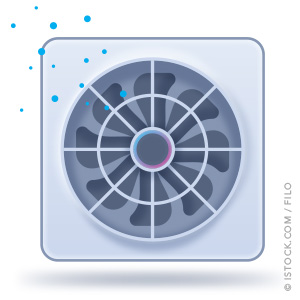
Fam Pract Manag. 2023;30(6):43
IMPROVE INDOOR AIR QUALITY IN YOUR OFFICE

As the most senior physician in the U.S. Pacific Command in 2020, serving in the region where the virus that causes COVID-19 first emerged, I gained a new appreciation for the importance of improving indoor air quality to reduce transmission of airborne pathogens.
Some physician practices require mask wearing to prevent pathogen transmission in shared spaces. Masks have benefits, but they require consistent action on the part of individuals, which is less likely to produce the desired outcome than implementing engineering controls.
A full overhaul of heating and air conditioning systems may not be practical in most settings, but a simple, evidence-based, and relatively inexpensive way to improve indoor air quality is to use portable high-efficiency particulate air (HEPA) filtration systems (i.e., air purifiers).1
While critics may say that viruses are small enough to slip through a standard HEPA filter, the Centers for Disease Control and Prevention (CDC) says HEPA filters are still effective because viruses expelled into the air from infected persons do not travel as discrete virions but in small droplets, and the filters capture the particles that carry the pathogens. The CDC provides detailed recommendations on how to employ filtration to improve your office's indoor air quality.2
SCHEDULE LONGER APPOINTMENTS FOR PATIENTS WITH TRAUMA
To better serve patients who have experienced trauma, my clinic piloted what we call “compassionate scheduling” — offering longer appointment slots to patients with a significant history of trauma to ensure we address their medical and social needs. At our clinic, a compassionate scheduling appointment was 60 minutes in length. Clinicians had discretion to decide how to use the time and whether to directly address the patient's past trauma. They could also include community health workers, social workers, care coordinators, diabetes educators, and a pharmacist in the appointments as needed.
Compassionate scheduling has limitations. Longer visits, billed as such, could pose a financial burden to patients, depending on their insurance coverage and deductibles. Clinics must also consider the impact on productivity and relative value units (RVUs); however, during our one-month pilot, our RVUs did not differ much from what we generate in a traditional scheduling template. Fewer appointments offered per day can also increase the time before another appointment is available. Thus, clinics should have a screening process to ensure compassionate scheduling appointments are offered to the patients who need them most. Overall, these longer visits can help clinicians incorporate trauma-informed care and may prevent clinician burnout.
USE COMMON SENSE TO EASE PRIOR AUTHORIZATION
Like many physicians, I find prior authorizations useless and annoying, but I've discovered a couple ways to ease the burden. First, I've delegated most of this work to my nurse. She's much more adept at getting approvals than I am, and she gains more expertise and efficiency with each one she does.
Second, I don't have her waste time on prior authorization for drugs that are so heavily discounted through GoodRx that it costs patients less to pay out of pocket for them than to use their insurance. I keep the GoodRx website handy to show patients how low-cost some drugs can be. So, my nurse will seek authorization for PSK-9 inhibitors or GLP-1 agonists, but not for tramadol, for instance. This doesn't solve all PA hassles, but it can reduce them.
